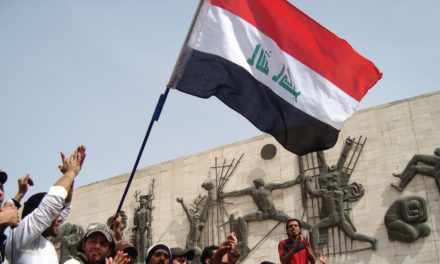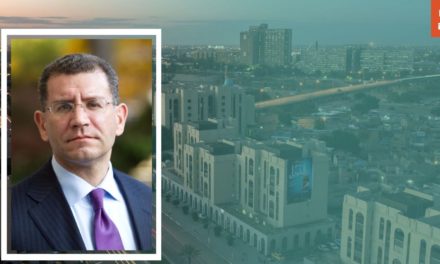(Rubble from the platform of Saddam Hussein’s statue in Baghdad’s Firdous Square. Photo: Ahmad Al Rubaye/AFP)
To me the first day of the Eid al-Adha holiday shall forever remain “Saddam’s Execution Day”. 13 years have passed, but I still remember vividly how ecstatic I was when I saw the news of his execution on national television. Watching the ultimate tyrant of our time being sent straight to Hell on the first day of Eid felt appropriate and provided much needed catharsis.
Back in 2003 when the American-led coalition overthrew Saddam, our dream as Iraqis was to live in a democratic, inclusive, and modernised country that would guarantee freedom and prosperity for all of its citizens regardless of their backgrounds. 16 years later, Iraqi democracy is still a work in progress, mostly because Iraqis do not seem to have learned their lesson and are continuing to show frightening history-repeating tendencies.
Saddam and his regime’s thugs have committed countless atrocities and inflicted genocide on many communities within Iraq. After all these years evidence of more heinous crimes against Iraqis by Ba’athists is still emerging, serving as a sobering reminder of how evil and inhumane Ba’ath autocracy was in Iraq.
Did we as Iraqis work to make sure that no Iraqi would ever have to go through what Saddam’s victims and their families had gone through? Did we make it our mission and duty to ensure that no genocide would ever happen again in this country? Our post-2003 track record suggests otherwise.
Our society has not learned the most important lesson from the Saddam era: Nothing good can come from forcing “the other” to abide by your own values or behave in a way which only you and not “them” deem as “appropriate”.
The Yazidi genocide happened because some Arab-Sunni communities in Nineveh made a conscious decision to betray their Yazidi sisters and brothers by siding with (and becoming) Da’ish terrorists. There are also Arab-Sunnis in Iraq who chose to turn on their Muslim Shi’a sisters and brothers because of their toxic anti-Shi’a bigotry and because of their fundamental objection to having Muslim Shi’as in positions of power in Iraq. Terror attacks and targeted assassinations against regular Muslim Shi’as in Baghdad and beyond were daily occurrences back then.
In the same way Muslim Shi’a militiamen in Baghdad massacred regular Muslim Sunni residents of the Capital because in their eyes the cold-blooded murder of countless innocent Muslim Sunnis was an proportionate response to the bombing of the holy Al-Askaryian shrine by al-Qaeda terrorists.
Our Christian sisters and brothers deserved so much better than what we had to offer them. The way the bad guys continued to step on them over and over again will never cease to burden our collective consciousness.
After all these years, inclusivity remains elusive to Iraqis. Acceptance of the “other” as “they” are without trying to contain “them” or impose your own values on “them” remains an alien concept to the majority of citizens of this country.
Some secularists with latent sectarian tendencies become offended by the slightest sincere expression of faith. On the other hand, self-proclaimed defenders of religion and Allah become offended by the liberal way of life and its social manifestations.
How many Iraqi women dress and behave always manages to rile up people. “Rebellious” women who aspire to live freely could even get killed, whilst members of sexual minorities are constantly targeted for being who they are. Most Iraqis love to slam our government and politicians, for very good reasons. However, anyone who is under the impression that we are a tolerant, pluralistic society that is unfairly plagued by a rotten political class, which it does not deserve is gravely mistaken.
If we continue to avoid reflecting on all the wrongs we have done/continue to do to each other and shift blame, this society will always continue to be prone to future unrest and adversity. There are certain Iraqis out there who are under the impression that the best way to eradicate sectarianism in Iraq is to stop talking about our faiths altogether, because as far as they are concerned, if we ignore the fact that Iraqis are of different faiths for a certain period of time, then sectarianism will eventually die down.
Sectarianism will not die down when we stop talking about and expressing our faiths. It will die down when Iraqis stop viewing the religious rituals of “other” Iraqis as offensive or irritating. As long as the personal and public freedoms of all citizens of this country are guaranteed in the eyes of the state and society, how any Iraqi chooses to worship or not worship Allah is nobody’s business but their own.
Countless attempts at sanitising our dark history have been made (and will continue to be made) by various malicious entities: attempts to reinvent Iraq under Saddam’s rule as a liberal pro-women oasis when his regime’s thugs had continuously imprisoned, raped, and executed many innocent Iraqi women and girls. Attempts to whitewash Iraqi Da’ish members as tribal rebels who have made an honest mistake. Attempts to bury the fact that there are Iraqis out there who chose to side with Da’ish death cult against their Iraqi sisters and brothers. Attempts to reintroduce rogue murderous militiamen as reformist statesmen. These attempts must be exposed and called out, not for the sake of clinging to the past but for the sake of building a future that is free from the past’s catastrophes.
Our modern history is too messy and beyond painful to fully comprehend and come to terms with. But if we continue to ignore the pain instead of processing it and admitting our mistakes, then our chances of recovery and moving on from the past are slim to none.
Those who continue to defend Saddam and the dark days of his rule have no place claiming to be concerned patriots. Infatuation with genocidal dictators, in addition to being a serious character flaw, is a clear indicator of having no concern whatsoever for citizens of Iraq who have suffered immensely under Saddam’s rule.
There are Iraqis out there who fervently slam Saddam and the Ba’ath Party and yet are just as willing to oppress their fellow Iraqis just because they do not approve of what they say or their way of life. Such Iraqis also need a serious wake-up call because their detachment from reality is unhealthy and dangerous.
We have come a long way since the horrific days of Saddam’s rule, but we still have some serious reckoning to do before our democracy becomes set in stone. An important reflection on Saddam’s Execution Day.

Noor Ali
Noor Ali is a resident of Baghdad and a Middle East observer, mainly focusing on Iraqi social justice & women’s rights.










